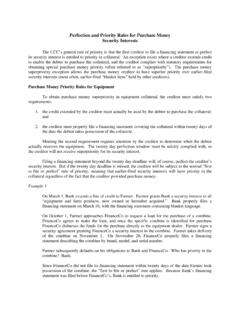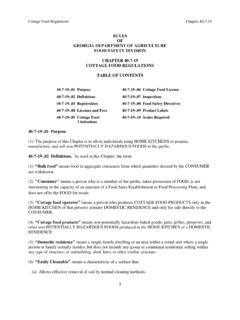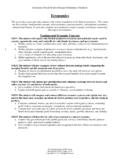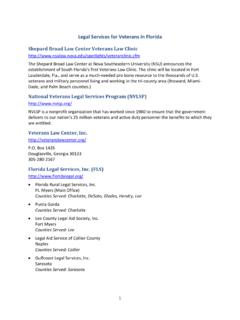Transcription of Subpoenas and Requests for Production
1 Subpoenas and Requests for Production - How can you safely respond? In determining whether a customer s banking records may be disclosed in response to a subpoena or request for Production of documents, a bank must consider the privacy provisions of both federal and state law. By their nature, federal privacy provisions remain consistent throughout the country. In contrast, state privacy laws can vary substantially. These materials address only federal law and Georgia law. If a bank has operations in other states in addition to Georgia, it must familiarize itself with the laws of those states as well. In summary, when looking to federal and Georgia law, there are three potentially applicable bank privacy laws that must be considered: (1) the privacy provisions of the federal Gramm-Leach-Bliley Act; (2) the federal Right to Financial Privacy Act; and (3) Georgia s bank privacy statute.
2 The Federal Gramm-Leach-Bliley Act The privacy provisions of the Gramm-Leach-Bliley Act prohibit a financial institution from disclosing a consumer s financial information (whether relating to a loan, a deposit account, or any other relationship with the bank) to any third party unless the Act s consent or notice requirements are met, or unless an exception applies. The primary purpose of these privacy provisions is to restrict a bank s for-profit sale or transfer of the customer s information without notice to the customer, rather than to restrict a bank s ability to respond to a subpoena or similar request . Nonetheless, because the literal language of the Act s provisions restricts any disclosure to third parties, it is necessary to assure that one of the Act s exceptions applies to allow disclosure.
3 Importantly, the Act s exceptions state that the privacy provisions do not apply to prohibit the following disclosures: 1. disclosures made to comply with a civil, criminal, or regulatory investigation, subpoena, or summons by federal, state, or local authorities; and 2. disclosures made to comply with federal, state, or local laws or other applicable legal requirements. Taken together, courts have determined that the exceptions permit disclosure to comply with a criminal or administrative investigation by an authorized government authority, or to comply with a validly issued subpoena or discovery request compelling disclosure under some applicable law. It is also worth noting that the Act s privacy provisions only affect disclosure of financial information of a consumer.
4 The Act defines a consumer as an individual who obtains financial products or services for personal, family, or household use, or the legal representative of such an individual. This means that the Act will not impact on disclosure of the financial information of a legal entity such as a corporation or limited liability company, or of a business customer. However, practically speaking, a financial institution should not be disclosing its customers information outside of a government investigation, subpoena, or discovery request in any event; thus, limitation of the provisions to consumers should only be an additional bit of comfort when disclosure is made in non-consumer cases. The Federal Right to Financial Privacy Act The Right to Financial Privacy Act ( RFPA ) is the most frequently misunderstood of the privacy laws affecting banks operating in Georgia.
5 The RFPA prohibits a bank from disclosing a customer s financial records to any federal government authority unless certain notice requirements are met or one of the (many) RFPA exceptions applies. The most frequently misunderstood aspect of the RFPA is that it only applies if the records are sought by a department or agency of the federal government. It does not apply if records are sought by a private individual or entity, even if the records are sought as part of a case pending in federal court. Moreover, it does not apply if records are sought by a state, county, or city government authority (such as a county sheriff s department, a city police department, the Georgia Department of Revenue, or the Georgia Bureau of Investigation).
6 Another aspect of the RFPA is that it can only apply where the customer is an individual or a partnership of five or fewer individuals. Thus, if the customer is a corporation or limited liability company, the RFPA will not impact a federal request for the customer s financial records. In addition to the above limitations, the effect of the RFPA on federal government Requests is severely limited by several exceptions that will cover most federal Requests a bank will encounter. For our purposes, the most important exceptions are that the RFPA does not apply to: 1. federal grand jury Subpoenas ; 2. Subpoenas or summonses issued under the Internal Revenue Code (which gives the IRS broad authority to investigate taxpayers financial records); or 3.
7 Validly issued discovery Requests or Subpoenas arising in a civil or criminal case to which both the requesting authority and the customer are parties (often called the litigation exception ). The requesting federal authorities are usually well aware of the RFPA and its exceptions, and make efforts to structure their Requests so that the RFPA will not apply. For example, while it is common for state and county law enforcement officials to simply send letters to banks requesting documents as part of a criminal investigation, federal law enforcement authorities usually utilize grand jury Subpoenas to obtain the documents they desire in their investigations. This is because a letter requesting documents would be covered by the RFPA, but a grand jury subpoena would not.
8 In those instances where the RFPA does apply and no exceptions are available, most of the burden is placed upon the requesting authority rather than the bank. Generally speaking, the requesting authority will be required to deliver a copy of the document request to the customer, along with a statement regarding the customer s right to object. In most instances, the customer is given a ten to fourteen day period to object. The bank is not involved with issuing the notice to the customer. The bank s sole duties are to assemble the requested documents once the request is received, and then hold those documents until the requesting authority gives the bank written certification that any applicable requirements of the RFPA have been satisfied.
9 Once the certificate is received, the bank can then turn over the requested documents to the authority. A customer can authorize the bank to turn over documents to a federal authority, but there are specific requirements for such an authorization. The authorization must: 1. be dated and signed by the customer; 2. state that it is revocable by the customer; 3. identify the records that can be disclosed; 4. identify the authority to which disclosure can be made, and the purpose for disclosure; and 5. be effective for a period of three months or less. As one can see, it will not be permissible for a bank to simply insert broad authorization language in an account agreement or signature card in expectation that RFPA requirements will thereby be avoided.
10 The authorization must be limited in duration and scope. Practically speaking, if the customer wants a federal authority to review financial records it would be a much better approach for the bank to provide any necessary documents directly to the customer. The customer can then provide those documents to any authority he may wish, without concern over whether RFPA authorization requirements have been met. Georgia s Bank Privacy Law ( 7-1-360) Georgia has its own privacy law affecting financial institutions disclosure of customer records. In practice, this law will usually have a bigger impact on the financial institution than the federal laws discussed above. Georgia s privacy law prohibits a financial institution from disclosing a customer s financial records except in the following instances: 1.






